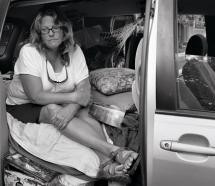It’s Not Easy to Get Back Up After You’ve Fallen

She found a four-foot-tall piece of cardboard at a grocery store and wrote on it:
I’D RATHER BE WORKING
HIRE ME IF YOU HAVE A JOB
Then she stood alongside the road and held up the sign. The day was so windy it was hard to hold on to. “I was like, ‘Please hire me,’ and everybody’s flying by, trying to ignore you, but this one guy drives up, looks at my résumé, looks at me and goes, ‘Very effective. I’ll take one of those.’ I said, ‘Thank you, I really appreciate that,’ but I never heard from him. And then a homeless guy came up to me and goes, ‘Wow. That ain’t gonna work.’ I didn’t want to talk to him about it. I just wanted to stick my sign out there — I didn’t have any more cardboard. And about halfway into it, I just started crying and I couldn’t stop. I was so embarrassed. It was incredibly humiliating. You know how a lot of women hold their hand over their mouth when they cry? I started doing that, and that’s when I raked in the money. I was sort of scared because there were so many cars that I was boxed in, and I was holding this gigantic sign and I was saying, ‘I’d rather work, I’d rather you take my résumé, please help,’ and I’m crying and the dollars just started coming out of the windows.” But finally she cried herself out, and people stopped giving. She made $12 in three hours, all of it drawn by tears.
“And then I went out the next day and didn’t get squat,” she says. “I was trying to figure out, ‘Should I start crying on purpose?’ But how do you cry on purpose?”
Rolling Stone has a very good piece profiling some middle class people who went from having stable jobs before the recession, to losing their homes and sleeping in their cars, and having to psychologically adjust to becoming homeless after the economy tanked. Janis Adkins, the 56-year-old woman in the blurb above, slept in her van, lived off her savings, and worked as many odd jobs she could find until she had to resort to pan-handling. When Adkins applied for emergency food stamps, she was denied because she had enough money to buy gas for her car and to pay her phone bill.
“The money’s for my phone, it’s for gas, it’s for my bills,” Adkins said.
“Why are you in a crisis,” the woman asked, “when you have a phone bill?”
“I need the phone so I can get a job. You can’t look for a job without a phone.”
“Why do you have bills?” the woman asked. “I thought you didn’t have a place to live.”
“I live in my van,” Adkins said. “I have insurance.”
“You have a 2007 van,” the woman said. “I think you need to sell that.”
“Please, I need a break,” Adkins said. “I need some help. I need to take a shower.”
“Why didn’t you have a shower?”
“I live in a van.”
The woman told Adkins to come back when she really needed help.
It really demonstrates how difficult it is to land back on your feet when you’ve lost nearly everything you have, but are still trying to hold on to the few things you do still have and need — a car to get you to a job interview, a phone that will allow potential employers to get back to you — to become stable again. It’s a heartbreaking story, and makes me grateful to know that if I ever lose everything, I’m lucky enough to have options that will keep me off the street.
Support The Billfold
The Billfold continues to exist thanks to support from our readers. Help us continue to do our work by making a monthly pledge on Patreon or a one-time-only contribution through PayPal.
Comments